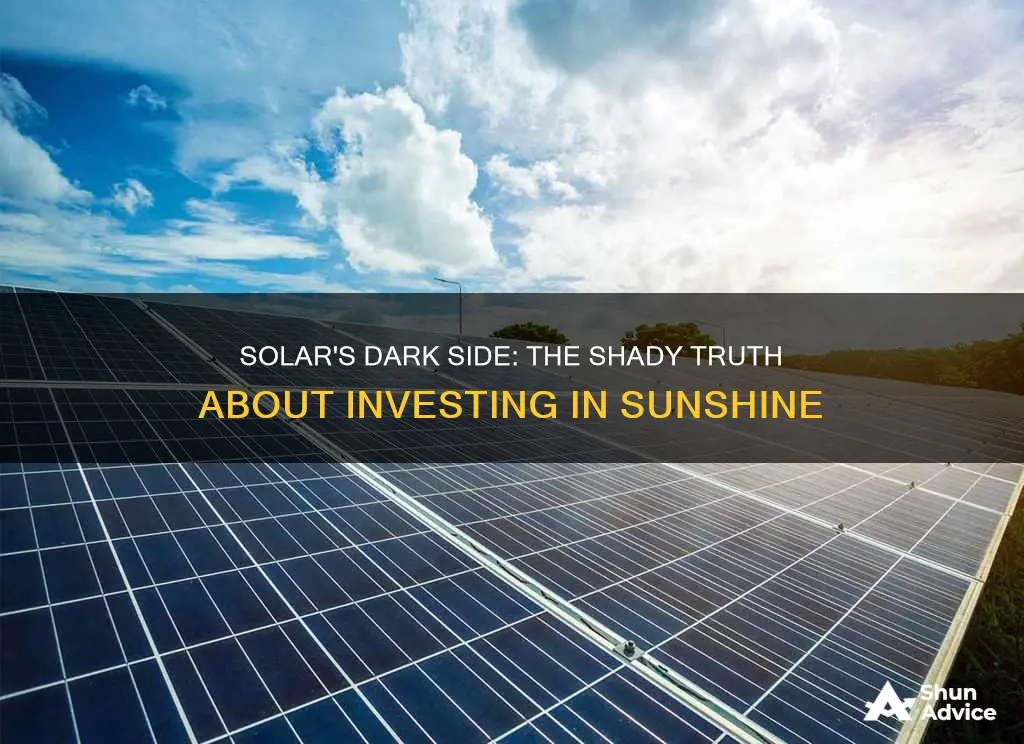
Solar panels are a huge financial commitment, and it's important to consider whether they are a good investment. While solar panels can save you money on electricity bills and increase your property's value, there are also some disadvantages to investing in them.
The payback period for solar panels varies depending on factors such as the cost of installation, the price of electricity, and the availability of incentives and rebates. On average, it takes around 7 to 12 years for solar panels to pay for themselves. However, in some states, this period can be as short as 5 years or as long as 16 years or more.
The location of your home is crucial when considering solar panels. If you live in an area with lots of sunlight and favourable incentives, you will likely see higher solar energy savings. Additionally, the size, shape, and orientation of your roof are important factors. Solar panels perform best on south-facing roofs with adequate space and minimal shade.
While solar panels can be a worthwhile investment for many homeowners, it's essential to carefully consider your specific circumstances before making a decision.
| Characteristics | Values |
|---|---|
| Initial installation costs | High |
| Long-term savings | Yes |
| Increase in property value | Yes |
| Payback period | 5-15 years |
| Electricity rates | High rates save more money |
| Energy consumption | High consumption = substantial financial benefits |
| Solar panel costs | $15,000 to $30,000 |
| Solar incentives and rebates | Available in some states |
| Net metering policies | Save the most money in places with net metering |
| Location and environment | Works best with lots of sun exposure and cool temperatures |
| Roof design | South-facing roofs without shade are ideal |
| Federal tax credit | 30% |
What You'll Learn

High upfront costs
Solar panels can be expensive to install, with the average cost of installation being around $19,000, and potentially much higher for homes that use a lot of electricity. This high upfront cost can be a barrier for some people considering solar energy. However, there are financing options available, such as solar loans, leases, and power purchase agreements (PPAs), that can help with these upfront costs.
The total cost of a solar panel system will depend on several factors, including the size of the system, the type of panels chosen, and any additional equipment needed, such as batteries or inverters. It is important to consider these factors when deciding whether to invest in solar panels, as the upfront cost can be significant.
In addition to the installation cost, there may also be costs associated with maintaining and repairing the solar panels over their lifetime. While solar panels typically have a long lifespan of 25 years or more, there may be instances where repairs or replacements are needed, which can add to the overall cost of the system.
Despite the high upfront costs, it is important to consider the long-term savings and benefits of solar panels. In many cases, the upfront investment can be offset by the savings on energy bills and the increase in property value. The payback period for solar panels, or the amount of time it takes to recoup the initial investment, is typically between 7 to 12 years, and the panels can continue to provide savings for up to 25 years or more.
When considering the upfront costs of solar panels, it is essential to weigh them against the potential long-term benefits and savings. While the initial investment may be significant, the payback period and potential for increased property value can make solar panels a worthwhile investment for many homeowners.
Investments: Spend, Save, or Grow?
You may want to see also

Low electricity bills
One of the main reasons why solar investments may not pay off as expected is when a household or business has relatively low electricity bills. Solar panel systems are often touted as a way to reduce energy costs, and while this is true, the level of savings is proportional to the amount of energy consumed. If your electricity bills are already low, the potential savings from solar may not be significant enough to justify the upfront investment.
Solar panel systems work by generating electricity during daylight hours, which can then be used to power your home or business. Any excess electricity generated can be fed back into the grid, earning you credits on your utility bill. However, if your energy consumption is low, you may not be taking full advantage of the electricity generated by your solar panels. As a result, your return on investment may be lower than expected.
For solar panels to be a worthwhile investment, it's important to have a balance between the amount of electricity generated and the amount consumed. If your energy needs are met with a small solar array, you may see a faster payback period. On the other hand, if your electricity consumption is high, a larger solar system may be a better investment, as it can lead to substantial savings over time. It's crucial to size your solar system appropriately to maximize its financial benefits.
Additionally, it's worth considering that solar panel systems typically have a lifespan of 25 to 30 years. While they can provide significant savings over this period, the initial investment can be substantial. If your electricity bills are already low, you may not see a significant enough reduction in your energy costs to make the investment worthwhile within a reasonable timeframe. Therefore, it's important to carefully consider your energy usage patterns and potential future changes before deciding on a solar investment.
To determine whether solar is a financially sound investment for your specific situation, it's advisable to conduct an energy audit and carefully review your electricity bills. Consider factors such as seasonal variations in energy usage, the potential for future increases in electricity rates, and the availability of incentives and rebates. By analyzing these factors, you can make a more informed decision about whether solar panels align with your economic goals and expectations.
Dogecoin: Worthy Investment or Just a Meme?
You may want to see also

Inconsistent solar panel efficiency
Solar panels are an increasingly popular investment for homeowners, but they are not without their drawbacks. One of the main issues with solar panels is their inconsistent efficiency. While solar panels can provide significant savings on electricity bills and increase property values, their performance is heavily influenced by environmental factors such as sunlight, temperature, and humidity levels.
Solar panels are at the mercy of the weather, and their efficiency can vary significantly depending on the amount of sunlight they receive. On cloudy or overcast days, solar panels may not receive enough direct sunlight to function optimally, resulting in reduced energy production. Additionally, changes in temperature can impact the performance of solar panels. As the temperature inside the panel fluctuates, the connections between the solar cells can weaken, leading to a decrease in efficiency over time.
Another factor affecting solar panel efficiency is humidity. High humidity levels or changes in humidity can negatively impact the panels in two ways. Firstly, if humidity penetrates the panels, it can alter the conductivity of the silicon cells, resulting in lower production over time. Secondly, high humidity combined with temperature changes can cause condensation on the panels, disrupting the sunlight entering the panel and reducing energy output.
The efficiency of solar panels also depends on their brand and quality. Higher-quality panels from reputable manufacturers tend to have better performance and slower degradation rates. Cheaper panels may experience more severe and rapid efficiency losses due to issues such as potential-induced degradation (PID) and microcracks in the silicon solar cells.
To maximise solar panel efficiency, it is crucial to consider factors such as installation location, panel brand, and maintenance. Installing panels in areas with direct sunlight exposure and choosing reliable panel brands can help improve efficiency. Regular monitoring of the system can also help identify and address any issues that may impact performance.
While solar panels offer numerous benefits, their inconsistent efficiency remains a challenge. By understanding the factors that influence their performance, homeowners can make informed decisions about their investment and take appropriate steps to optimise their solar panel systems.
Investor Numbers: Who's in the Game?
You may want to see also

Lack of suitable installation space
Solar panels are typically installed on rooftops, and several factors determine whether a roof is suitable for solar panels.
Firstly, the roof's orientation is crucial. In North America, south-facing roofs are ideal as they receive the most direct sunlight during peak solar production hours. However, east- or west-facing roofs can still capture sufficient sunlight, although they may not be optimal for solar performance.
Secondly, the amount of shade on the roof is important. Solar panels require direct sunlight to function effectively, so any shade, whether from trees, neighbouring buildings, or other objects, can significantly reduce their electrical output.
Thirdly, the pitch or slope of the roof should be considered. In the UK, most roofs have a pitch between 30-50°, which is suitable for solar panels. In the US, a pitch between 30-45° is considered suitable, and while a pitch equal to the property's latitude is ideal, any surface that receives multiple hours of direct sunlight can work for solar generation.
Fourthly, the roof material matters. Solar panels can be installed on most modern roofing materials, such as asphalt shingle, clay tile, metal, and tar and gravel roofs. However, some materials like wood shingles, thatch roofing, asbestos-containing roofs, and glass roofs are not suitable due to fire risk, safety hazards, or insufficient strength to support the panels.
Finally, the roof's condition and age are important considerations. Solar panels are heavy, so the roof must be able to support their weight, and any damage, deterioration, or holes in the roof should be addressed before installing solar panels. Additionally, if the roof is over 15 years old, it may need to be replaced before installing solar, as removing and re-installing panels mid-way through their lifespan can be costly and complex.
In summary, while solar panels can be a worthwhile investment for some homeowners, a lack of suitable installation space, particularly on the roof, can be a significant barrier.
The IT Investment Equation: Unraveling the ROI Riddle
You may want to see also

Poor solar incentives
Solar incentives and rebates can help reduce the initial investment in solar panels and make them more attractive. However, these incentives and rebates are not always available or sufficient, and this can impact the payback period and return on investment (ROI) of solar panels.
The federal government in the United States offers a 30% federal tax credit for solar panel installations. However, this benefit is limited for homeowners who don't pay a significant amount in income taxes or who have a very low tax liability. Additionally, not all states and utility companies offer the same incentives and rebates, and these can vary widely depending on the location. Some states offer net metering programs that provide full credit for excess energy produced by solar panels, while others offer reduced credits or no net metering at all.
The availability and generosity of solar incentives can significantly impact the payback period and ROI of solar panels. In states with shorter payback periods, such as Hawaii and Massachusetts, the availability of incentives plays a significant role. On the other hand, states with longer payback periods, such as Louisiana and North Dakota, often have fewer incentives available.
The quality of solar incentives can also be impacted by changing compensation patterns with utility companies or unexpected lapses in system performance. Additionally, some states do not offer net metering, which can reduce the energy savings for homeowners. In these cases, excess solar energy is credited at a lower rate, known as the "avoided cost rate," which can further decrease the benefits of solar panels.
To make an informed decision about investing in solar panels, it is essential to consider the solar incentives and rebates available at the federal, state, and local levels. Consulting a tax advisor can also help determine how to best capitalize on any available tax credits. By understanding the incentives available and their potential impact on payback periods and ROI, individuals can make a more informed decision about whether solar panels are a worthwhile investment for their specific situation.
Equity Investment: Why Take the Risk?
You may want to see also
Frequently asked questions
Solar investments may not pay off if you live in an area with fewer sunny days and fewer solar incentives.
Other reasons include your roof being shaded, not having enough space, or being oriented north, which may cause your panels to underperform.
Paying off your solar panels early can help you get state and federal tax credits, avoid paying more in interest, and increase the value of your property.
If you plan to get rid of your solar panels before taking advantage of tax credits, you may make a significant loss. Making early payments might also mean paying bigger sums upfront, which can hurt your pocket.
On average, it takes about 7.5 to 12 years for solar panels to pay for themselves, but this can vary depending on factors such as the cost of the panels, electricity bill savings, and efficiency.







